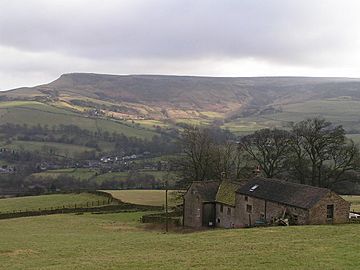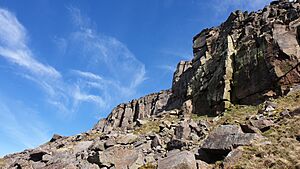Combs Moss facts for kids
Quick facts for kids Combs Moss |
|
|---|---|

Combs Moss from Thornly Lee
|
|
| Highest point | |
| Elevation | 503 metres (1,650 ft) |
| Geography | |
| Location | Peak District, England |
| OS grid | SK0476 |
| Topo map | OS Explorer OL24 |
Combs Moss is a large, flat-topped hill in the beautiful Peak District of England. It sits between the towns of Chapel-en-le-Frith and Buxton in Derbyshire. The highest point, called Combs Head, is about 503 meters (1,650 feet) above sea level. It's a great place to explore nature and history!
Contents
Exploring Combs Moss
What is Combs Moss?
Combs Moss is a moorland plateau, which means it's a wide, flat area of land. It has edges like Combs Edge and the Goyt Valley to the west. To the north, you'll find the village of Combs. Black Edge and Dove Holes are to the east, and Buxton is to the south.
Fun Facts About Combs Moss
A long-distance walking path called the Midshires Way crosses the southwestern part of Combs Moss. This path actually follows an old Roman Road!
Much of Combs Moss is private land used for grouse shooting. However, thanks to a law passed in 2000, this area is now "Open Access" land. This means people can walk and explore here freely.
Discovering Castle Naze Hillfort
What is a Hillfort?
A hillfort is an ancient type of fort built on a hill. People in prehistoric times often built them for protection. They used the natural shape of the land to help defend themselves.
History of Castle Naze
Castle Naze is an ancient hillfort located on the northwest edge of Combs Moss. It overlooks the Combs Reservoir, which is a special natural area. The fort covers more than 2 acres (about 8,000 square meters) and has a triangular shape.
It had strong defenses, including a large double wall on one side. On other sides, the natural rock edges helped protect it. You can still see a clear path that led up to the fort's old entrance.
In 1873, people found a Roman coin from Emperor Constantine the Great here. They also found Romano-British pottery. Later, in 1957, students from Nottingham University studied the site. They believed the fort was first built during the Iron Age. It was then rebuilt or used again in Medieval times. During their study, they found buried remains of pits, fireplaces, workshops, and even parts of old buildings.
Today, Castle Naze hillfort is a protected Scheduled Monument. This means it's an important historical site that must be preserved. The name "Naze" comes from an old English word meaning "headland" or "promontory."
Climbing at Castle Naze
The rocky cliffs at Castle Naze are made of a type of rock called gritstone. These cliffs are a very popular spot for people who enjoy crag climbing.
 | Lonnie Johnson |
 | Granville Woods |
 | Lewis Howard Latimer |
 | James West |


